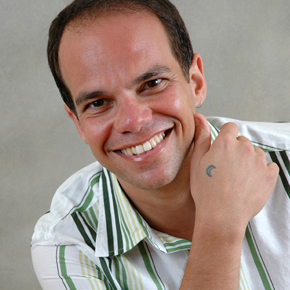Water
by Marcelo Moutinho He entered the bathroom completely naked, in harsh silence. Only the red washcloth hung from his shoulders, giving his hunched back some colour. I led him to the shower cabinet, trying to steady his slow steps. To support him.
He entered the bathroom completely naked, in harsh silence. Only the red washcloth hung from his shoulders, giving his hunched back some colour. I led him to the shower cabinet, trying to steady his slow steps. To support him.
There wasn’t room for both of us inside, so I stayed out as he stepped in. I had to leave the curtain open but made a point of closing the bathroom door, although no one else was in the apartment.
The tiles were sweating. He barely looked at me, keeping his head down so the nape of his neck seemed elongated. I tried to deflect his embarrassment with small talk: Does that feel okay? Did you catch the commotion in Laranjeiras yesterday? Hear about the awful traffic? How did Botafogo get on? Shall we make a start?
I turned the taps to get the temperature just right. He remained silent. Then I wet the cloth and asked him to turn around.
He set his hands rigidly against the wall, as if under serious threat, as if I were pointing a gun or a knife at him. The restless curtain brushed my face. It wouldn’t stop closing. Though I kept tugging it open, each time it fell back along the rail. It wouldn’t stop.
I guided the cloth over his head, neck, torso, arms, legs, feet. The wet cloth explored his body, soaked up the sweat and filth, caressed him.
He kept still, although his hands couldn’t stop shaking. It wasn’t because of the cold; we both knew that. As I scrubbed he kept his eyes shut tight, in pitch darkness. Maybe deep down he was remembering: “Once upon a time, I bathed this boy.”
I turned off the taps and reached for a towel. I asked him to take care not to slip as he stepped out and stood on the mat. I steadied him with one hand. As I dried him I heard him say, very softly, almost in a whisper: Thank you. And I sensed there is no way to come out clean from a shower like that.
Translated by Kim M. Hastings.

Author portrait © Claudia Dantas
Marcelo Moutinho was born in Madureira, a suburb of Rio de Janeiro, in 1972. A writer and journalist, his books include the story collections A palavra ausente (The Absent Word, Rocco, 2011), Somos todos iguais nesta noite (We Are All the Same Tonight, Rocco, 2006), the anthology Dicionário Amoroso da Língua Portuguesa (Loving Dictionary of the Portuguese Language, Casa da Palavra, 2009), and the children’s book A menina que perdeu as cores (The Girl Who Lost Colours, Pallas, 2013), with illustrator Anabella López.
marcelomoutinho.com.br
Kim M. Hastings studied Brazilian language and literature at Brown University and has a PhD in Spanish and Portuguese from Yale. She has translated fiction by Lúcia Bettencourt, Rubem Fonseca, Rachel Jardim, Alberto Mussa and Edgard Telles Ribeiro. Her translation of Ribeiro’s O punho e a renda is forthcoming (as His Own Man) from Faber & Faber, Scribe and Other Press.

